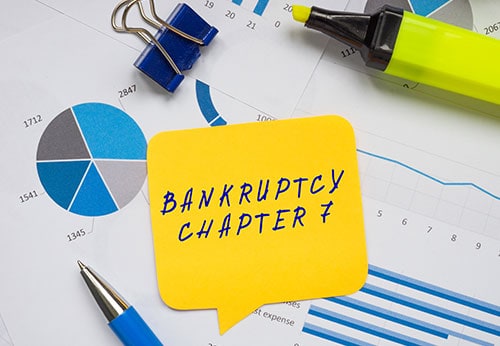 Chapter 7 Bankruptcy is known as a liquidation bankruptcy and comes right from Chapter 7 of the Bankruptcy Code. It allows either individuals or businesses to wipe out a lot of different kinds of debts (though not everything). In the case of a business, the business is basically closed down by the trustee appointed in the case, so rather than in an individual case where the individual receives a discharge of the debts, the business ends.
Chapter 7 Bankruptcy is known as a liquidation bankruptcy and comes right from Chapter 7 of the Bankruptcy Code. It allows either individuals or businesses to wipe out a lot of different kinds of debts (though not everything). In the case of a business, the business is basically closed down by the trustee appointed in the case, so rather than in an individual case where the individual receives a discharge of the debts, the business ends.
There are different kinds of Chapter 7 Bankruptcy cases. There’s what we refer to as a no-asset Chapter 7, where there is basically nothing to liquidate, and then there’s an asset Chapter 7. In the case of an individual debtor, the applicable law determines how many assets that particular debtor can keep without having the trustee in the case sell anything. Now, if that debtor is over what we call exemptions in an asset case, then the trustee can sell assets and pay creditors with the money that’s raised.
Most Chapter 7s are no-asset cases, but we do run into some asset cases from time to time. An asset case takes far longer than a no-asset case to close because there is more work for the trustee to do. A no-asset Chapter 7 Bankruptcy typically lasts from three to four months, on average, while an asset case can run a year or longer.
What Requirements Must Be Met to Qualify to File for a Chapter 7 Bankruptcy?
A Chapter 7 Bankruptcy can be filed by either an individual or a business. The only time that two individuals can legally file together is when they are married to each other. One question that comes up a lot is whether a husband and wife have to file together, and the answer is that they do not. They can file individually, even if they are filing at the same time.
There are not that many requirements to be in a Chapter 7 Bankruptcy. Typically, you have to make under a certain amount of income, and that amount changes and is based upon where you live and how big your household is. Generally speaking, the more money you make as a household relative to the number of people in your household, the harder it is to qualify for a Chapter 7 Bankruptcy. Though your assets aren’t a qualifier, they will determine whether your case is going to be an asset or a no-asset Chapter 7. For that reason, it’s important for your attorney to look at what assets you have so that you know, should you file this kind of a case, what you can keep, what you can’t, and what’s going to happen to your stuff. As I said, in most cases, you can keep everything, but there is a limit.
What Debts Are Dischargeable in a Chapter 7 Bankruptcy?
There are exceptions, but what you generally can discharge, or get rid of, in a Chapter 7 Bankruptcy are things like credit cards, medical bills, personal loans, and deficiency balances resulting from, let’s say, a repossession or foreclosure of property. You can get rid of certain tax debts, depending on eligibility as determined by a complicated analysis that your attorney can perform. There are situations where you can discharge student loans, but it’s not as effective as we’d like it to be right now.
There are other exceptions. You cannot, for example, discharge domestic support obligations, like alimony or child support, or damages related to an accident involving a DUI charge. Other exceptions for Chapter 7 include criminal fines and penalties and government fines and penalties (such as parking tickets, traffic tickets, citations, etc.).
What Assets Can I Keep After Completing a Chapter 7 Bankruptcy?
What you’re able to keep really depends on which state exemptions apply. If you have lived in one state for a long time, the laws of that state will generally determine how much stuff you can keep. If you’ve moved around, your attorney would have to run an analysis and tell you. In Maryland, you can typically keep up to $12,000 of assets per filer, and if you file with your spouse, then you can keep $12,000 each. You can’t combine the $12,000 together, but each spouse gets $12,000, plus you can usually keep everything that you have in retirement.
Also, Maryland law allows you to protect your home equity using something called Tenants by the Entirety, meaning any equity in your home is protected against creditors except any creditor that has a joint debt against both spouses. If you are married and your property is titled as Tenants by the Entirety, that equity is not something that can be used to pay your creditors in the bankruptcy, at least not if only one of you owes that creditor. This exemption does not apply to the Internal Revenue Service if you owe them money.
For more information on Chapter 7 Bankruptcy in the State of MD, an initial consultation is your next best step. Get the information and legal answers you are seeking by calling (443) 492-9003 today.

We Are Here To Help. Call Today For A No Cost Evaluation
(443) 492-9003

